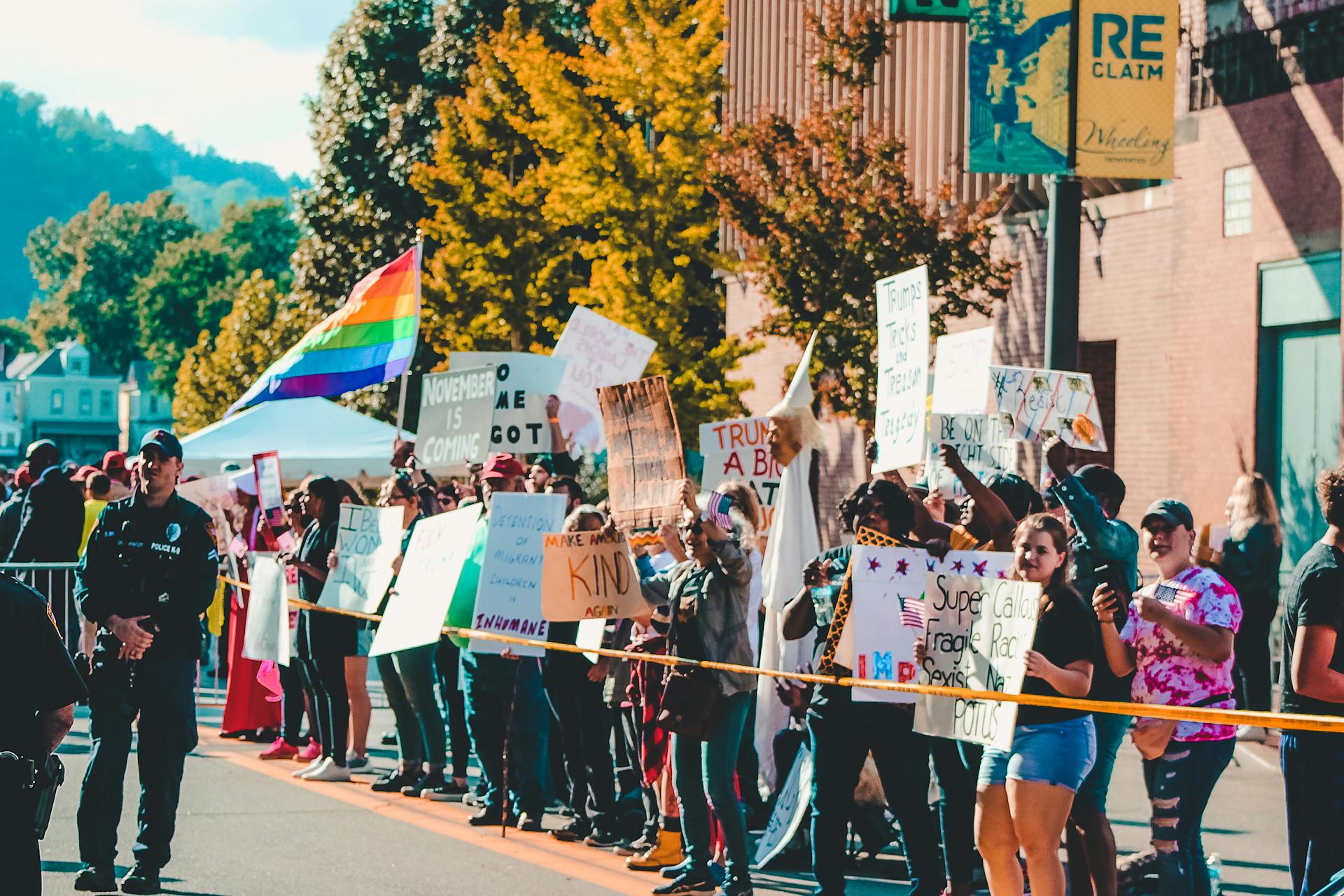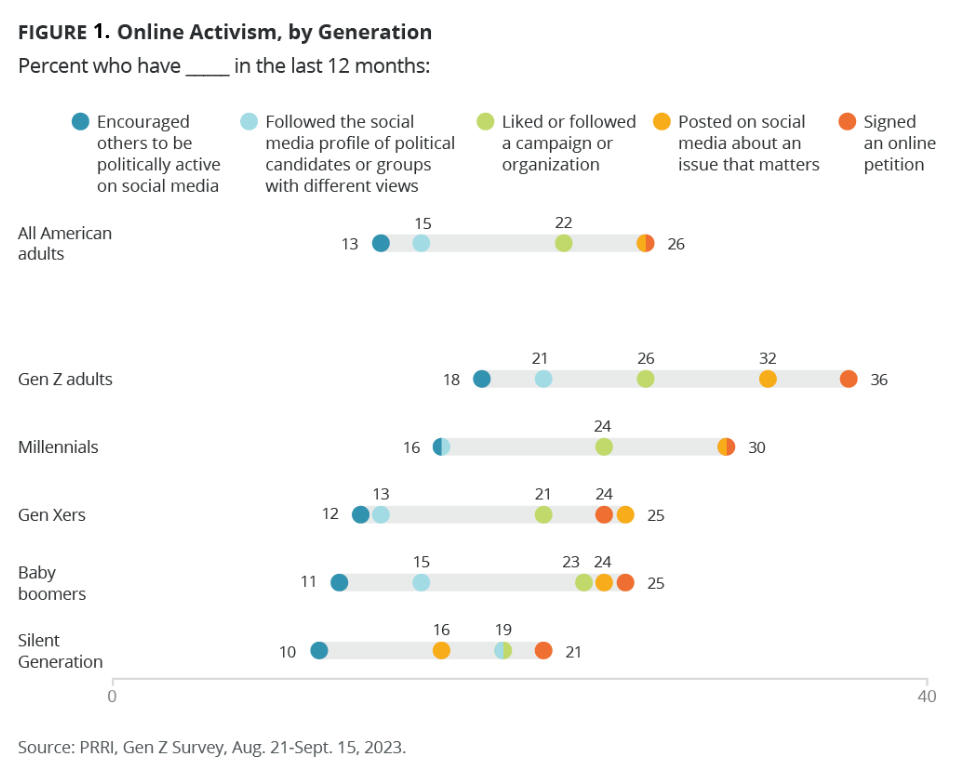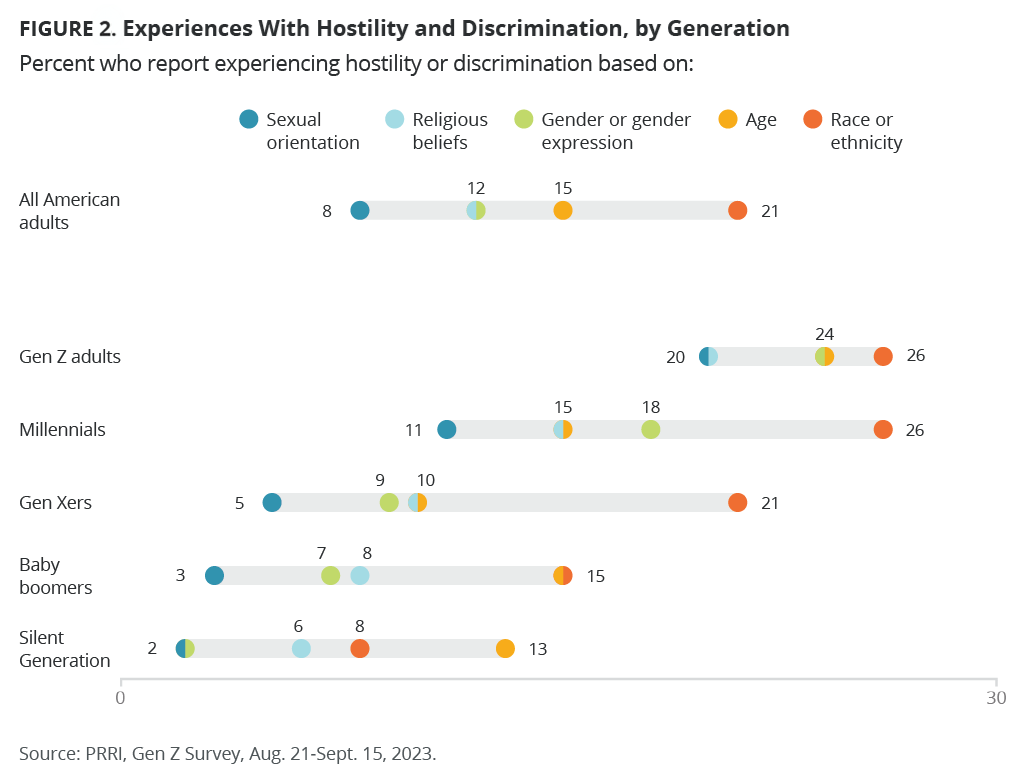Is Gen Z Switching Political Direction? Not So Fast.

Melissa Deckman, Ph.D., is the CEO of PRRI and a political scientist who studies the impact of gender, religion, and age on public opinion and political behavior.
The dominant story about the arrival of Generation Z into our nation’s politics has largely been one about young people hungry for progressive political change. We have witnessed young activists marching in the streets for action on climate change, racial justice, LGBTQ rights, and gun violence prevention. Turnout among young voters has broken records in the past three election cycles, with Gen Z voters helping Democrats recapture Congress in 2018, reclaim the White House in 2020, and maintain control of the US Senate in 2022.
As the 2024 presidential election approaches, however, this narrative is being challenged. Some early polls suggest that former President Donald Trump is threatening to close the gap with younger voters, especially young men. Scholars, including generational analyst Jean Twenge, point to data showing that 12th-grade boys have been identifying as conservative at higher rates since Trump’s presidency—a trend that Republicans like Missouri Senator Josh Hawley, say is the result of the political left’s alleged war on masculinity. Polls also find that the top concern for younger Americans is inflation and the cost of living, as it is for most Americans—and younger Americans are far more likely to say that they trust Trump to handle the economy compared with President Joe Biden, which portends potential trouble for Biden and his party come November
The current lack of enthusiasm for Biden among Generation Z, however, should not be mistaken for evidence of a looming rightward shift among this cohort. Recent PRRI data finds that Gen Z adults, defined as Americans aged 18 to 25, remain more likely to identify as Democrats (36%) than Republicans (21%) or independents (30%)—including Gen Z men, of whom just 24% identify as Republican. Moreover, Gen Z men are more likely to identify themselves as liberal than conservative (38% versus 31%, respectively).
The GOP brand is especially struggling with Gen Z women, just 18% of whom call themselves Republicans, compared with 41% who identify as Democrats. With Gen Z women almost twice as likely to describe themselves as liberal (47%) rather than conservative (24%), Gen Z women make up the most progressive cohort of voters in the nation—by far.
Aside from ideological and partisan labels, Gen Z Americans hold progressive positions on a wide range of public policies, both economic and cultural, at higher rates than older Americans. PRRI’s Gen Z Survey finds that three in four Gen Zers, including a majority of Gen Z Republicans, back government relief from student loan debt. Along with Millennials, Gen Z Americans are far more supportive of government action to address climate change than older Americans. Majorities of Americans under the age of 30 believe that policing and prison systems need to be completely rebuilt in order to ensure racial equality, rates higher than older Americans.
Generation Z also strongly favors abortion rights. PRRI’s American Values Atlas, which interviews more than 20,000 Americans annually, finds that 68% of young Americans 18 to 29 support abortion’s legality in all or most cases, including more than seven in ten young women—as do strong majorities of young men (roughly six in ten). The battles over abortion rights post-Dobbs have helped secure Democratic victories in elections in the last two years, but polls taken right after the 2022 midterms show that younger Americans were the only group to list abortion as the top issue that drove their vote.
Outside of voting, Gen Z is just as politically engaged—if not more so—than older Americans. PRRI asked Americans how often they participated in politics in the past year, including posting online about politics, signing an online petition, or encouraging others to engage in politics through social media, or offline, boycotting brands over their political stances, attending political rallies or community meetings, or contacting political officials. On all measures, Gen Z Americans participate at similar or higher rates than older Americans. Importantly, political engagement rates are notably higher across most forms of engagement among Gen Z adults who identify as Democrats than Gen Z Republicans, aligning with where we have seen the largest and most active protests over the last decade.

This coincides with findings in my forthcoming book, which shows that, controlling for the usual factors that propel Americans to participate in politics, a commitment to progressive political causes—ranging from feminism, abortion rights, climate change mitigation, the prevention of gun violence prevention, and a passion for racial justice and LGBTQ rights—is propelling younger Americans to engage in politics at higher rates, especially Gen Z women and Gen Zers who identify as LGBTQ+.
Gen Zers’ lived experiences drive these progressive attitudes and their collective action. Gen Z is our country’s most racially and ethnically diverse generation ever; it is also the queerest. Coming of age politically during the #MeToo movement and as record numbers of women ran for political office (in response to Trump’s election) has had a profound impact on how young Americans view politics, especially young women. Striving toward greater inclusion in our political system, many Gen Zers are more keenly aware of discrimination they and others face. We find that Gen Zers are more likely than older Americans to report facing hostility and discrimination because of their gender, gender expression, and sexual orientation; along with Millennials, they also report more experience with racial and ethnic discrimination.

Of course, none of these attitudes suggest that Joe Biden or other Democrats can handily rely on the youth vote as they have in recent election cycles. Biden’s favorability is at record lows, particularly with younger Americans, who find Biden out-of-touch andtoo old. Many Gen Z progressive activists believe Biden has not done enough to prevent more gun violence or stop climate change—nor has he fought hard enough to secure abortion rights nationally. And many are dismayed at Biden’s continued support for Israel amid its war on Gaza.
But, there is also little indication that the current incarnation of the Republican Party is appealing to many Gen Zers, as GOP leaders continue to fight for policies that are extremely unpopular with young people, ranging from abortion bans, book bans and curricular challenges in public schools and college campuses that remove LGBTQ themes or forgo honest accounts of our nation’s fraught history with racism, and staunch opposition to even modest gun control policies. The GOP’s growing embrace of Christian nationalist themes will also ring hollow with most young people, who are far less religious than older Americans.
The larger problem for Democrats is Gen Z’s lack of enthusiasm for the upcoming election. A recent poll from Harvard’s Institute of Politics finds that younger voters are significantly less likely to indicate that they “definitely” plan on turning out to vote in November than they were relative to this point in the 2020 election cycle. Still, Americans’ vote choices are often less about being inspired by fealty to their own political party and more about disdain toward the party with which they disagree. If they continue to champion their current positions on abortion, gun rights, LGBTQ rights, and more, the Republican Party will struggle to attract the youth vote come November.

